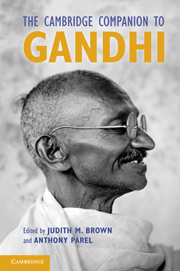Book contents
- Frontmatter
- Introduction
- Part I Gandhi: The historical life
- Part II Gandhi: Thinker and activist
- 4 Gandhi’s key writings
- 5 Gandhi’s religion and its relation to his politics
- 6 Conflict and nonviolence
- 7 Gandhi’s moral economics: The sins of wealth without work and commerce without morality
- 8 Gandhi and the state
- 9 Gandhi and social relations
- Part III. The contemporary Gandhi
- Guide to further reading
- Index
9 - Gandhi and social relations
from Part II - Gandhi: Thinker and activist
Published online by Cambridge University Press: 28 May 2011
- Frontmatter
- Introduction
- Part I Gandhi: The historical life
- Part II Gandhi: Thinker and activist
- 4 Gandhi’s key writings
- 5 Gandhi’s religion and its relation to his politics
- 6 Conflict and nonviolence
- 7 Gandhi’s moral economics: The sins of wealth without work and commerce without morality
- 8 Gandhi and the state
- 9 Gandhi and social relations
- Part III. The contemporary Gandhi
- Guide to further reading
- Index
Summary
Much of recent scholarship on Gandhi is propelled by three urgent contemporary concerns. First, the growth of Hindu communalism, making secular historians turn to histories of tolerance and hence to Gandhi, a Hindu martyr to Hindu communalism. Second, post-colonial scholars, anxious about what is authentic and what is derivative in Indian modernity, search for moderns like Gandhi who were firmly anchored in Indian tradition. Finally, discontents with modern developmental paradigms renew the significance of Gandhi, a forceful critic of industrialism. For all three, Gandhi offers a resolution for the ills of modernity. All, moreover, identify an essential Gandhi, seeking him in his moral discourses rather than in his political and social work: discourses founded on an unwavering certainty about Truth. There is a strong tendency for icon making at work, rather than historical reassessment. The present chapter, in contrast, regards Gandhi’s political thinking and moral-ethical ideas as interactive, carrying profound social implications. Gandhi, moreover, never made absolute Truth claims. Perhaps the most interesting aspect of his life was his capacity for changing himself, his openness to experiences, his ‘experiments with Truth’. His life would, at any given moment, constitute a shifting and open totality: imbibing contradictory elements and transforming its praxis continuously.
- Type
- Chapter
- Information
- The Cambridge Companion to Gandhi , pp. 173 - 196Publisher: Cambridge University PressPrint publication year: 2011
- 8
- Cited by

